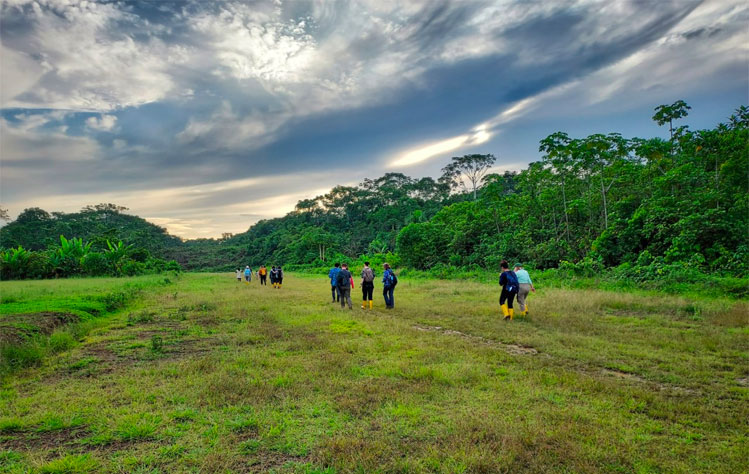Webster University Receives a Grant to Create a New Exchange Program in Ecuador
February 16, 2023
 Webster University was awarded $36,000 by the 100,000k Strong in the Americas Innovation
Fund to create a bilateral exchange program between the U.S. and Ecuador. The project,
“In Defense of the Pachamama: Centering Indigenous Knowledge in Defense of Human and
Nature’s Rights,” brings together indigenous environmental and human rights defenders,
leaders, scholars, students, and allies in both countries to learn from indigenous
worldviews on effective methods to combatting climate change and preserving human
rights.
Webster University was awarded $36,000 by the 100,000k Strong in the Americas Innovation
Fund to create a bilateral exchange program between the U.S. and Ecuador. The project,
“In Defense of the Pachamama: Centering Indigenous Knowledge in Defense of Human and
Nature’s Rights,” brings together indigenous environmental and human rights defenders,
leaders, scholars, students, and allies in both countries to learn from indigenous
worldviews on effective methods to combatting climate change and preserving human
rights.
Under the new exchange program, Webster University will partner with Universidad Intercultural de las Nacionalidades y Pueblos Indígenas Amawtay Wasi (UNIPIAW) in Quito, Ecuador, to bring students and faculty from both institutions together in Ecuador and the U.S.
“The ‘In Defense of the Pachamama Exchange Program’ is an example of Webster’s strategy of engaging in meaningful partnerships that support bilateral student and faculty exchange in Latin America,” said Webster University President Julian Schuster. “With this program, faculty have created an experience that brings together place-based learning and cross-cultural understanding to focus on one of the world’s wicked problems. The program truly embodies our global mission.”
During the Ecuador experience, the Sapara Nation will welcome the joint group into their community for an immersion experience with Sapara leaders serving as teachers. This component builds upon Webster’s award-winning faculty-led study abroad program Indigenous Rights and the Rights of Nature in Ecuador.
For the U.S. component, UNIPIAW students and faculty, along with Sapara leaders, will join Webster faculty and students in the U.S. to engage with indigenous nations, scholars, activists and leaders to learn from their worldviews and exchange ideas and educational strategies around indigenous rights and nature’s rights. The grant funding will support the development of those partnerships in the U.S.
“This program has been designed to create spaces where indigenous students, teachers and leaders and their allies, who share a commitment to collective rights, and the rights of nature can come together in solidarity, silence and speech to learn from the ancestral knowledge, experience, and living territories of the people and groups involved,” said Dr. Dana Hill, Webster’s Quito-based adjunct faculty member who leads the existing Webster study abroad program. Dr. Hill is one of the grant project co-leads.
Hannah Verity, Webster’s director of Global Program Development and grant project co-lead, said, “this grant will allow us to evolve the existing study abroad experience into a more complete bilateral exchange. This is critical in building diverse experiential learning curriculum that centers knowledge and approaches that are typically excluded from U.S. educational paradigms.”
Hill will work in collaboration with Robert Delgado, professor and Law School coordinator at UNIPIAW, on the curriculum development. Delgado will also serve as a project co-lead.
“Together, our efforts will build a strong, sustainable partnership that will enable theoretical and practical co-learning between diverse peoples and types of knowledge, especially those that have been invisibilized,” said Pablo Pomboza, president/dean of UNIPIAW.
The grant, which was awarded as part of the 2022 US-Andean Innovation Fund Grant Competition, was announced last week by the Partners of the Americas and the Bureau of Western Hemisphere Affairs at the U.S. Department of State. Twenty-four new grant-winning teams between higher education institutions in the United States with Colombia, Peru, Ecuador, and Bolivia were awarded in support of innovative partnerships that create access to inclusive training and exchange programs for underserved students and faculty
The 100K Strong grant-winning teams will engage 31 regional higher education institutions in Colombia, Peru, Ecuador, and Bolivia in partnership with a diversity 23 U.S. colleges and universities in 17 states to implement new exchange and training programs for upwards of 100 students and faculty during 2023-2024
The core funding support for “In Defense of the Pachamama Exchange Program: Centering Indigenous Knowledge in the Defense of Human and Nature’s Rights” is through the 100,000 Strong in the Americas Innovation Fund and its partners CAF: Development Bank of Latin America, and Colombia’s Ministry of Science, Technology, and Innovation (MinCiencias), along with the Bureau of Western Hemisphere Affairs at U.S. Department of State (WHA/DOS), as part of the dynamic public-private sector collaboration between WHA/DOS and partners of the Americas, working with companies, foundations, regional government entities, and academic networks in the United States and the rest of the Western Hemisphere to create innovative, sustainable partnerships that provide access to new models of academic exchange and training programs in the Americas.
Learn more and join the Innovation Network at https://www.100kstrongamericas.org/
